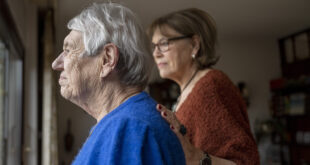By Mike Milstein
Bruce Kaye is an active supporter of Abbeyfield, which provides living accommodations for older people who want affordability, security, companionship and independent living.
“I was born in Central Otaga. I really didn’t put down roots until I followed an attractive young lady to Nelson.” He married her, became House Surgeon at the hospital, and later set up shop as a Nelson GP for the rest of his working life. Bruce and Jenny met on the tennis court, but once married they had no time to pursue this passion. Bruce was fully occupied as a GP and Jenny was busy raising five youngsters. Now, with the children grown up, they keep occupied with gardening, maintaining the family house, and walking the dog twice a day. Bruce also has a sailing dinghy, but he says “now it’s my grandchildren who sail it and I repair it.”
There has been “a huge shift from my parents’ generation concerning ageing. One of my aunts stayed at home and looked after her mother, which is what they did then. She had no career. Her mother died when my aunt was 45. The rest of her life was essentially rather lonely. That pattern has changed. Expecting that the younger generation will look after their parents is not the ideal model. The nuclear family has dispersed. The older generation is left on its own.”
“This is where the Abbeyfield idea comes in. When it started here fifteen years ago ten percent of the Nelson population was over 65. Now it is fifteen percent and will rise to thirty percent by 2031. There aren’t going to be enough others to look after us. We’ll have to look after ourselves; entertain ourselves; occupy ourselves.”
Abbeyfield looks like a good way to respond to the accommodation side of the situation. It began in England fifty years ago when a retired Cold Stream Guardsman noticed that “so many older people in London were suffering terribly from loneliness. There were no state institutions, only the poor house. He bought a little house on Abbeyfield Road and invited two older people to live with him. His house was soon replicated. Within two years there were five more around London. The movement spread and there are now more than seven hundred houses in England.”
Abbeyfield, a not-for-profit charitable organization, went international in 1988 and “came to New Zealand about fifteen years ago. The first house was in Stoke, which has ten residents, each with their own rooms/ensuites, which they can furnish as they wish. They share communal facilities—lounge, dining room, and kitchen. They are a significant part of the house committee that runs the place. One person is employed as housekeeper and provides two meals a day. Residents have total independence, but they also have support, security and, most important, companionship.”
“For the first five years, the Stoke house had 100 percent occupancy and then had a waiting list of twenty. We looked around for more land and found some belonging to the Presbyterian Church near Tahunanui Beach. After struggling for years we now have access to development funds, loans, and grant money from Housing New Zealand. Tenders are out for building; we have a waiting list and we are interested to hear from others who wants to live in it as well as volunteers who want to help out.”
“Abbeyfield allows ageing people to leave large homes, gain time, space and freedom to get out and do things. This also releases family homes back into the community.”
Bruce reminds us that “only about five percent of our community needs rest homes. The rest of us will not. We need to recognize this and mould our own lives. I love Abbeyfield. Why do I bother?” He quotes the Chinese proverb: “If you want to be happy for life, help other people.”
Note: This article, which appeared in The Leader, Nelson, NZ, on October 29, 2009, summarizes an interview aired by Fresh FM that was conducted by Dr. Annie Henry and sponsored by Age Concern, Nelson. If you want to share your thoughts with the Conscious Ageing Network (CAN) or wish to know when interviews will be aired and when CAN articles will appear in the Leader, send an email to agewell@xtra.co.nz.









Join the Discussion
Type out your comment here:
You must be logged in to post a comment.